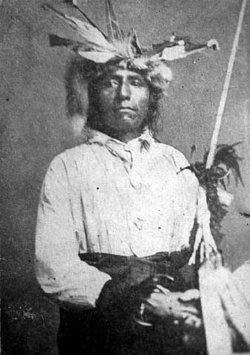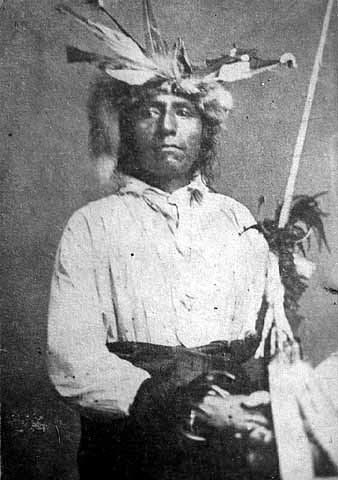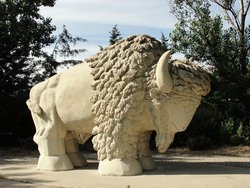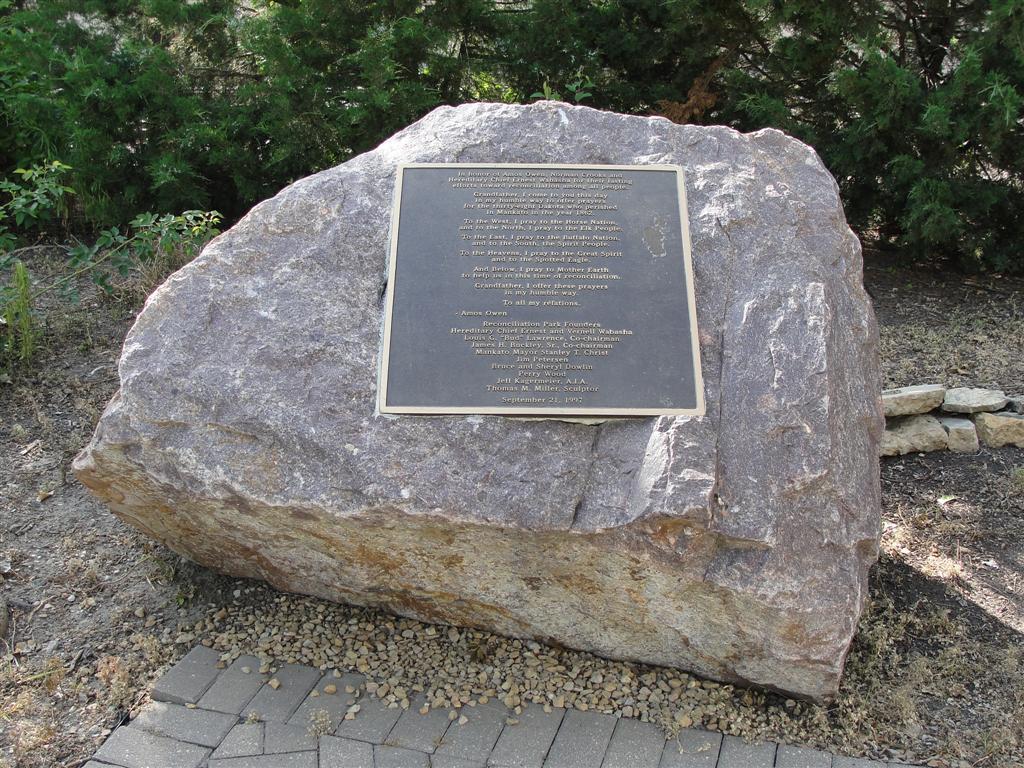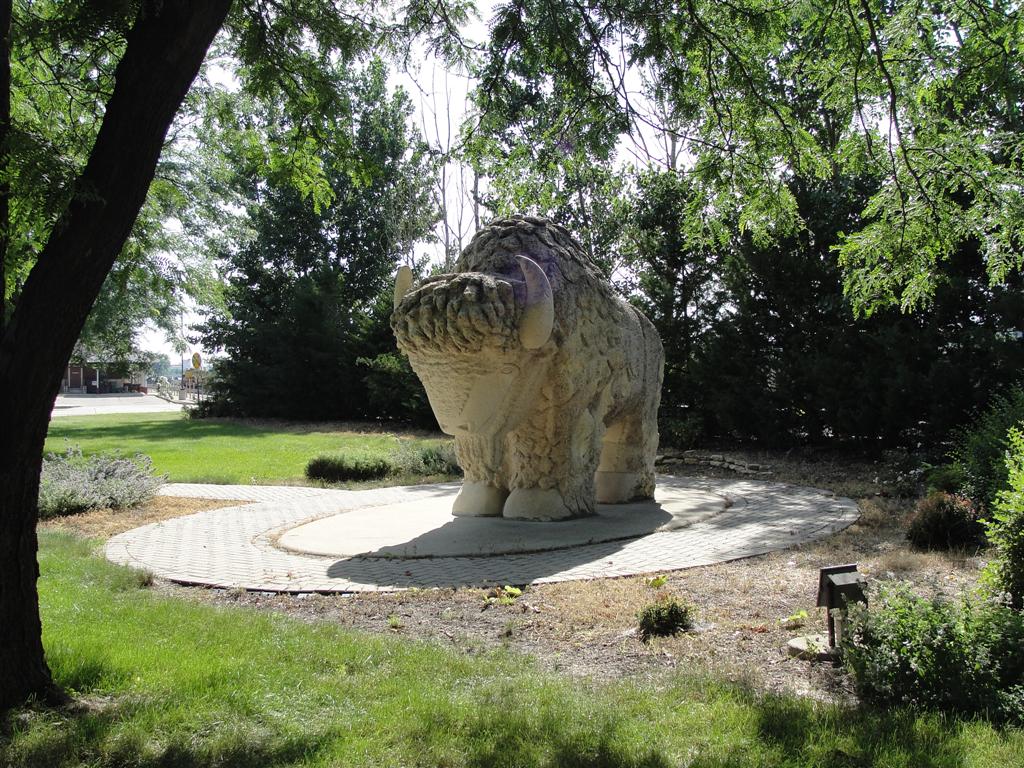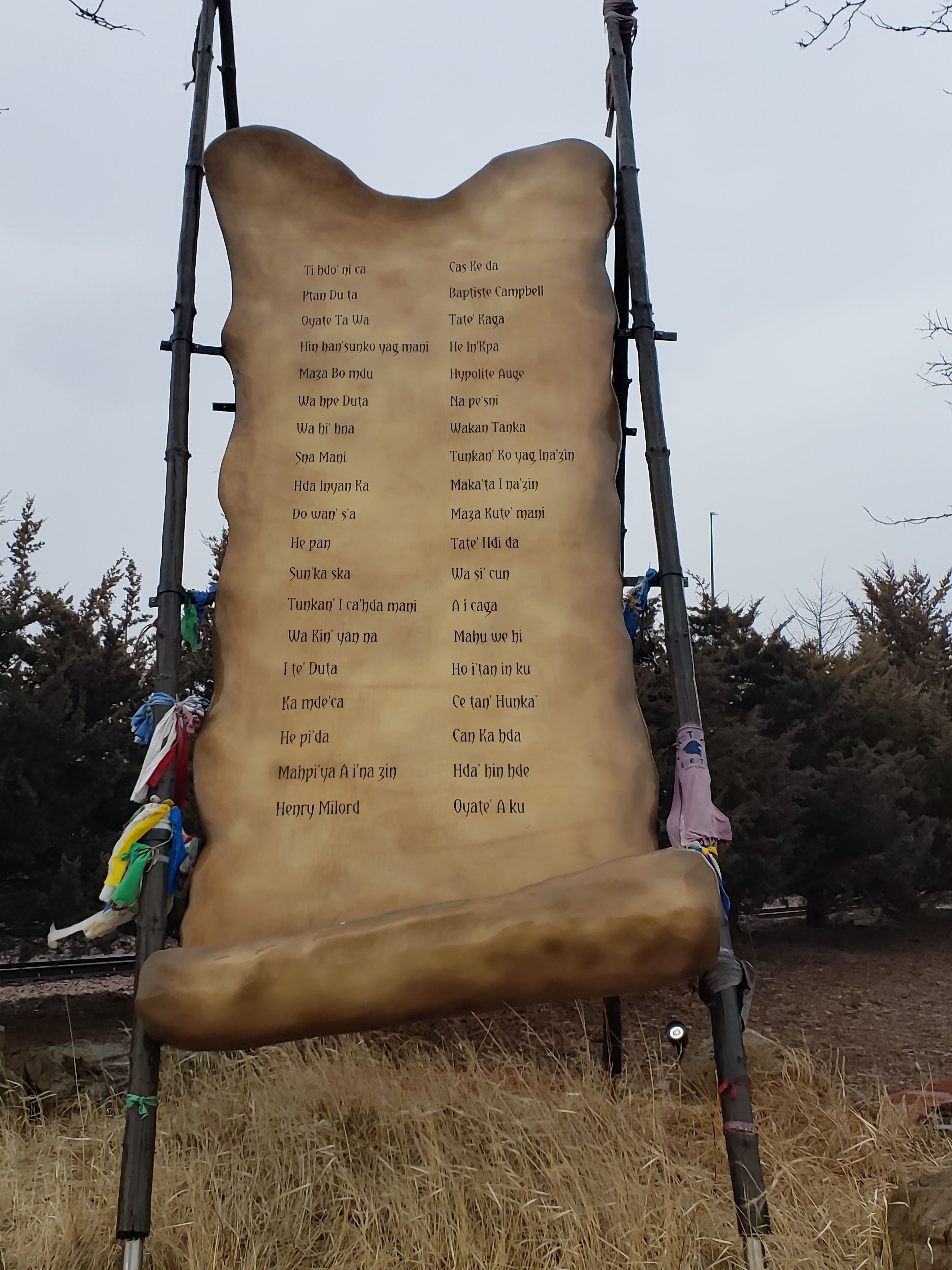During the Dakota War, Chaska risked his life to save some of his white friends, including George Spencer, and to protect Sarah Wakefield, a white woman who had been captured by the Dakota. Wakefield was freed after six weeks of captivity and credited Chaska with saving her and her infant from certain murder. However, Chaska was taken captive by the US military, along with 400 other Sioux who voluntarily released the 269 captives taken prisoner during the Dakota War. After the white captives were freed at Camp Release, the Dakota were taken into custody and Chaska was among them.
Of the 400 Dakota men taken into custody, 303 were tried and convicted in a kangaroo court by a military commission. President Abraham Lincoln reviewed the cases and pardoned 265 of the 303 condemned men. Chaska's name was on the presidential pardon list. However, on Dec. 26, 1862, he was hanged along with 37 other Dakota men who had been sentenced to death.
The bodies of the men were buried in a mass grave, dug in the sandy bank near the river. The grave was being guarded by one or more Minnesota Infantry soldiers. That night, local area physicians raided the grave to steal the bodies for use as cadavers for medical science studies. The soldiers did not interfere. One of the soldiers, John F. Meagher, cut off the rope that still bound Chaska's hands and feet, and then cut off a braid of his hair with the intention of sending them to Gleason's relatives.
Sarah Wakefield had testified on behalf of Chaska while he was in custody, and gave an account of his innocence. She was horrified when she read a newspaper account two days after the execution and found his name among those who were executed. He had been hanged "by mistake" in place of Chaskadon.
She demanded an explanation from Rev. Stephen Riggs, who had assisted in transferring the prisoners to the gallows. He had earlier pressured Wakefield to testify that she had been raped during her captivity, but she would not lie. After the execution, Riggs sent a letter to her claiming that Chaska's hanging was a case of mistaken identity; he and the other officials that morning had simply "forgotten" that another Indian in custody and sentenced to be executed had a similar name and confused Chaska with the other condemned man.
However, Riggs' story was not easily believable. He and the clergy and soldiers who gathered the prisoners together the morning of the execution knew them all well after their imprisonment of many months, and they especially knew Chaska. Wakefield believed that Chaska had been executed on purpose because of the spreading rumors and gossip that he had sexual relations with her during her captivity. These beliefs persisted, despite her denial of it and her testimony on Chaska's behalf.
Following is the Rev. Stephen Riggs' explanation of the mistake in the letter he wrote to Sarah Wakefield after the execution:
Mrs. Wakefield, Dear Madam:
In regard to the mistake by which Chaska was hanged instead of another, I doubt whether I can satisfactorily explain it. We all felt a solemn responsibility and a fear that some mistake should occur. We had forgotten that he was condemned under the name of We-chan-hpe-wash-tay-do-pe. We knew he was called Chaska in the prison and had forgotten that any other except Robert Hopkins, who lived by Dr. Williamson, was so called. We never thought of the third one; so when the name of Chaska was called in the prison on that fatal morning, your protector answered to it and walked out. I do not think anyone was to blame. We all regretted the mistake very much.
With kind respects, yours truly,
S. R. Riggs.
Sarah Wakefield later wrote a narrative about her captivity in the hope that it might clear Chaska's name and her own, but the attempt was unsuccessful. She wrote the following in her account:
Now I will never believe that all in authority at Mankato had "forgotten" what Chaska was condemned for, and I am sure, in my own mind, it was done intentionally. I dare not say by whom, but there is One who knoweth every secret, either good or bad, and the time will come when he will meet that murdered man, and then he will find the poor Indian's place is far better than his own.
-Sarah Wakefield
(c) Copyright 2009 C. K. Coffin
Native American Graves Protection and Repatriation Act
The braid of hair cut from Chaska's body and taken by the soldier, John Meagher, never made its way to Gleason's relatives. It was made into a watch chain and donated by Meagher to the Minnesota Historical Society in 1887. The watch chain was put on display in their museum for a time, but was eventually destroyed in a fire.
Legal Case Notes
Following is the legal case number and description for Chaska. His name was not on the list of those to be executed, but was on the list of those who were pardoned because he saved Mary Anderson from being killed and persuaded his comrades to take her captive instead.
Case No. 359. Chas-ka-hda. -- Is proven to have been of the party, and present when Patville was killed, and to have saved Mary Anderson (who had been wounded) from being killed, and to have taken her prisoner.
Following is the legal case number and description for another man with a similar name who was tried, convicted, and sentenced to be executed. Instead, Chaska was executed in his place:
Case No. 121. Chaskay-don, or Chaskay-stay. Convicted of shooting and cutting open a woman who was with child.
During the Dakota War, Chaska risked his life to save some of his white friends, including George Spencer, and to protect Sarah Wakefield, a white woman who had been captured by the Dakota. Wakefield was freed after six weeks of captivity and credited Chaska with saving her and her infant from certain murder. However, Chaska was taken captive by the US military, along with 400 other Sioux who voluntarily released the 269 captives taken prisoner during the Dakota War. After the white captives were freed at Camp Release, the Dakota were taken into custody and Chaska was among them.
Of the 400 Dakota men taken into custody, 303 were tried and convicted in a kangaroo court by a military commission. President Abraham Lincoln reviewed the cases and pardoned 265 of the 303 condemned men. Chaska's name was on the presidential pardon list. However, on Dec. 26, 1862, he was hanged along with 37 other Dakota men who had been sentenced to death.
The bodies of the men were buried in a mass grave, dug in the sandy bank near the river. The grave was being guarded by one or more Minnesota Infantry soldiers. That night, local area physicians raided the grave to steal the bodies for use as cadavers for medical science studies. The soldiers did not interfere. One of the soldiers, John F. Meagher, cut off the rope that still bound Chaska's hands and feet, and then cut off a braid of his hair with the intention of sending them to Gleason's relatives.
Sarah Wakefield had testified on behalf of Chaska while he was in custody, and gave an account of his innocence. She was horrified when she read a newspaper account two days after the execution and found his name among those who were executed. He had been hanged "by mistake" in place of Chaskadon.
She demanded an explanation from Rev. Stephen Riggs, who had assisted in transferring the prisoners to the gallows. He had earlier pressured Wakefield to testify that she had been raped during her captivity, but she would not lie. After the execution, Riggs sent a letter to her claiming that Chaska's hanging was a case of mistaken identity; he and the other officials that morning had simply "forgotten" that another Indian in custody and sentenced to be executed had a similar name and confused Chaska with the other condemned man.
However, Riggs' story was not easily believable. He and the clergy and soldiers who gathered the prisoners together the morning of the execution knew them all well after their imprisonment of many months, and they especially knew Chaska. Wakefield believed that Chaska had been executed on purpose because of the spreading rumors and gossip that he had sexual relations with her during her captivity. These beliefs persisted, despite her denial of it and her testimony on Chaska's behalf.
Following is the Rev. Stephen Riggs' explanation of the mistake in the letter he wrote to Sarah Wakefield after the execution:
Mrs. Wakefield, Dear Madam:
In regard to the mistake by which Chaska was hanged instead of another, I doubt whether I can satisfactorily explain it. We all felt a solemn responsibility and a fear that some mistake should occur. We had forgotten that he was condemned under the name of We-chan-hpe-wash-tay-do-pe. We knew he was called Chaska in the prison and had forgotten that any other except Robert Hopkins, who lived by Dr. Williamson, was so called. We never thought of the third one; so when the name of Chaska was called in the prison on that fatal morning, your protector answered to it and walked out. I do not think anyone was to blame. We all regretted the mistake very much.
With kind respects, yours truly,
S. R. Riggs.
Sarah Wakefield later wrote a narrative about her captivity in the hope that it might clear Chaska's name and her own, but the attempt was unsuccessful. She wrote the following in her account:
Now I will never believe that all in authority at Mankato had "forgotten" what Chaska was condemned for, and I am sure, in my own mind, it was done intentionally. I dare not say by whom, but there is One who knoweth every secret, either good or bad, and the time will come when he will meet that murdered man, and then he will find the poor Indian's place is far better than his own.
-Sarah Wakefield
(c) Copyright 2009 C. K. Coffin
Native American Graves Protection and Repatriation Act
The braid of hair cut from Chaska's body and taken by the soldier, John Meagher, never made its way to Gleason's relatives. It was made into a watch chain and donated by Meagher to the Minnesota Historical Society in 1887. The watch chain was put on display in their museum for a time, but was eventually destroyed in a fire.
Legal Case Notes
Following is the legal case number and description for Chaska. His name was not on the list of those to be executed, but was on the list of those who were pardoned because he saved Mary Anderson from being killed and persuaded his comrades to take her captive instead.
Case No. 359. Chas-ka-hda. -- Is proven to have been of the party, and present when Patville was killed, and to have saved Mary Anderson (who had been wounded) from being killed, and to have taken her prisoner.
Following is the legal case number and description for another man with a similar name who was tried, convicted, and sentenced to be executed. Instead, Chaska was executed in his place:
Case No. 121. Chaskay-don, or Chaskay-stay. Convicted of shooting and cutting open a woman who was with child.
Advertisement
See more Chaska or Wakinyatawa memorials in:
- Dakota Sioux Memorial - 1862 Chaska or Wakinyatawa
- Mankato Chaska or Wakinyatawa
- Blue Earth County Chaska or Wakinyatawa
- Minnesota Chaska or Wakinyatawa
- USA Chaska or Wakinyatawa
- Find a Grave Chaska or Wakinyatawa
Explore more
Sponsored by Ancestry
Advertisement
